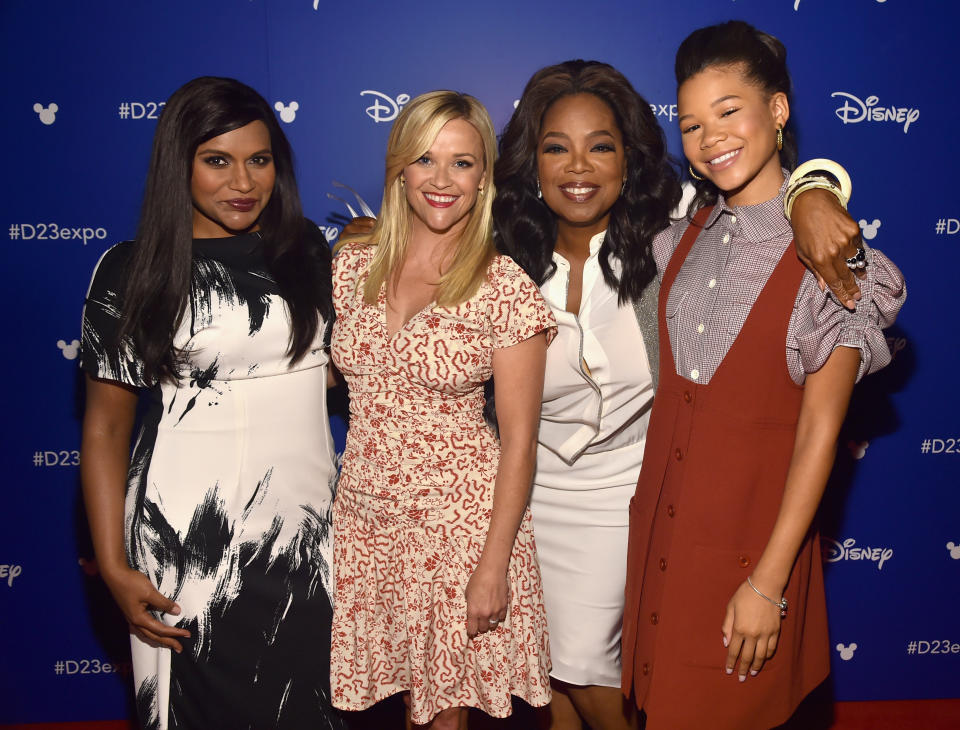The feminist symbolism connecting recent 'Time' covers is pretty powerful
Time magazine’s latest cover, starring the female-first cast of A Wrinkle In Time, is evoking comparisons to last week’s issue, dedicated to “Person of the Year: The Silence Breakers,” both a homage to fearless women.
The film stars Reese Witherspoon, Mindy Kaling, Oprah, and Storm Reid (of 12 Years a Slave) and according to Time, producer Catherine Hand made the film 54 years after she, as a 10-year-old, penned a 1963 letter to Walt Disney, begging the movie man to remake her beloved childhood book. The plot entails a 13-year-old girl named Meg who, protected by three female guardian angels called “The Mrs.,” embarks on a multi-dimensional mission to rescue her scientist father.


“As a child, Hand assumed that the power to adapt Wrinkle rested with a single man. But it took a collective of women to finally do it,” reported Time, adding that the book’s author, Madeleine L’Engle, grew up feeling ostracised and yearning to make an impact: “She’s also angsty and angry and troubled by the injustices around her.”
Time called the film “a way to change Hollywood” and Witherspoon agrees, Instagramming a photo of the cover Monday with the caption, “Change is coming…”
A post shared by Reese Witherspoon (@reesewitherspoon) on Dec 18, 2017 at 12:00pm PST
The cover (shot by Michal Pudelka) generated excitement on social media, not unlike last week, when the magazine released its annual “Person of the Year” issue, dedicated to a group of women dubbed “The Silence Breakers” for sparking awareness of sexual harassment, as part of the #MeToo movement, which emboldened women to come forward with their experiences.
A post shared by TIME (@time) on Dec 18, 2017 at 5:30am PST
Featured are Taylor Swift who won a civil case against a Colorado DJ who assaulted her during a photo opportunity in 2013, Ashley Judd who in October revealed she was sexually harassed by mogul Harvey Weinstein, Uber engineer Susan Fowler, who was instrumental in exposing a company culture of sexual harassment, California lobbyist Adama Iwu, whose Los Angeles Times letter called for an end to harassment in politics, and Isabel Pascual, an immigrant from Mexico, who did not use her real name.
Also pictured is the elbow of an unknown woman, a hospital worker in Texas, who chose to hide her identity to protect her family. “She is faceless on the cover and remains nameless inside TIME’s red borders, but her appearance is an act of solidarity, representing all those who are not yet able to come forward and reveal their identities,” according to Time.
On the surface, both covers are strikingly similar — the diverse group of women is dressed in black with intense facial expressions — but the similarities run deeper with themes of feminism, social justice, and controversy.
“Group photos can be difficult to pull off because each woman has her own unique and personal story, but collectively, they’ve achieved something extraordinary,” Kira Pollack, deputy editor of Time, tells Yahoo Lifestyle.
The women featured on the ‘Person of the Year’ cover didn’t know each other before the shoot but there was no red-carpet treatment. “When Susan Fowler met Ashley Judd, it wasn’t about meeting a celebrity — they were unified. It was moving,” says Pollack, adding, “We chose black clothing because it’s a simple, basic color that most people own and feel comfortable wearing.”
The #MeToo movement has been called a cultural revolution, but as Time notes of The Silence Breakers, “This reckoning appears to have sprung up overnight. But it has actually been simmering for years, decades, centuries…”

A Wrinkle In Time sets the tone for the future. Director Ava DuVernay, the first African-American woman to direct a big-budget film, told Time that she wanted Meg to have brown skin and the guardian angels to be diverse in size, religion, and age, and be “black, white and someone who wasn’t either. “I wasn’t just casting for actresses,” she said. “I was casting for leaders — icons.”
“It’s not shied away from. It is front and center,” DuVernay said at the New Yorker Festival of her casting of Reid, a woman of color. “She is hopping planets and flying and saving the freakin’ world. She’s saving the world. Saving the world from darkness, and in the film darkness is defined as the darkness within us. She’s saving us from ourselves. It’s deep.”
And the timing of these two covers is impeccable. “When women play powerful roles, it gets into the zeitgeist and the culture and you start seeing women everywhere,” says Pollack. “It’s just happening.”
Read more from Yahoo Lifestyle:
Actresses may wear black to the Golden Globes to protest sexual harassment. Is that ‘slacktivism?’
Eminem is still using the word ‘retarded’ — why that’s an issue
Follow us on Instagram, Facebook, and Twitter for nonstop inspiration delivered fresh to your feed, every day.
